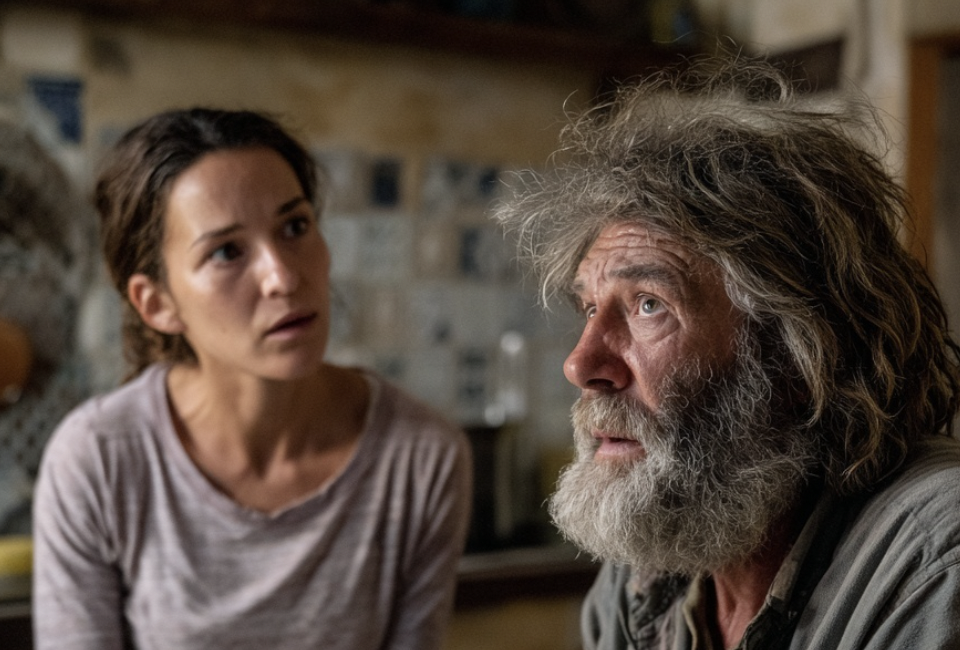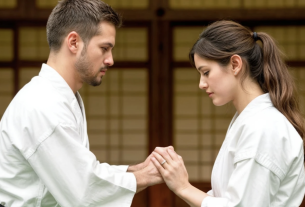Zhanna sat in the kitchen; her eyes were puffy from tears, her hands shaking. Yesterday her husband, Andrey, had come home acting strangely—silent, avoiding her gaze, nervously fingering something in his pocket. And this morning he announced, as if handing down a sentence:
“I’m leaving, Zhanna. I need to be alone. But I can’t leave you by yourself.”
“What do you mean, you’re leaving?” she snapped. “Where? To whom?”
“That doesn’t matter. The important thing is, I found help for you. There will be a man in the house.”
“Have you lost your mind? What man?”
“Semyon. He’s homeless, yes. But he used to be a metalworker. A decent person. Doesn’t drink. He’ll help around the place. Don’t be afraid of him.”
And he left. And there on the doorstep stood an older man in a worn jacket, his face deeply lined, his gaze timid. He took off a battered cap and stepped over the threshold, unsure of himself.
From that moment, Zhanna’s life split into “before” and “after.”
The first few days passed in a fog. Semyon settled into the old shed behind the house. He asked for nothing—just boiling water for tea. He fixed the crooked fence, welded a handle back onto the garden gate, repaired the faucet. He did everything quietly, neatly, with a dignity Zhanna hadn’t seen in a long time.
She kept her distance. Inside, resentment boiled—at Andrey, at his cold departure, at the fact that instead of support he had left her with a stranger, a poor old man. As if she herself were no longer needed by anyone, as if her life were a museum of old things.
One evening she dropped a plate and swore sharply. Semyon said softly:
“Forgive me… If you’re afraid, I’ll go. Your husband said you were ill. And I… I’ve lost loved ones too. I thought maybe I could help somehow.”
“I’m not ill,” Zhanna snapped. “I’m just tired. Very.”
But for the first time in a long while, she didn’t sit alone at the kitchen table. Semyon sat across from her—no unnecessary words, but with such a quiet kindness that something inside her tightened and trembled.
Two weeks passed. On an icy night, Zhanna brought him a blanket. Then she fed him hot borscht. Then she asked him to put up a curtain rod. He did everything without a word, gratitude in every movement.
Sometimes he spoke—about his wife, who had died of illness. About his son, who was killed while serving in the army. About how he ended up alone, how he was thrown out of his home for debts, how he slept in basements and broken-down shacks. About how he once saved a little boy on the street and, for the first time in many years, felt alive.
Zhanna cried into her pillow. Not only from pity. From shame. For judging by appearances. For forgetting that old age is not an ending but a continuation of life. And Semyon became the first person in a long time to ask:
“And how are you? Is it hard on you? Have you eaten today?”
After a month and a half, Andrey came back. Clean-shaven, in a new jacket, with a bottle of wine.
“So, had enough of that old man?” he smirked. “I left for Tanya, but she turned out to be a real piece of work and threw me out. Sorry. Shall we get back together?”
Zhanna looked at him for a long time. Then she said quietly:
“I don’t want to.”
“What?! Because of that bum?”
“No. Because of you. You left. You betrayed me. And he stayed.”
Semyon stood in the kitchen doorway, in his old sweater. Andrey said with disdain:
“He’s nothing to you! A pauper!”
“He’s a human being,” Zhanna replied calmly. “And you… you didn’t even manage to remain one. Leave. And don’t come back.”
In the spring, Semyon packed his things.
“You’re leaving?” Zhanna’s voice trembled.
“Yes, Zhannochka. You healed my heart. My soul, too. But you’re a woman. You need a man beside you, not an old fellow like me. I’ll come visit. I just… have to give you a chance to be happy again.”
He kissed her hand—slowly, respectfully, like in old films.
A year passed. Zhanna got a job teaching at the village school. On Teacher’s Day the whole class brought her flowers. Among the pupils was a boy—Semyon’s grandson, Yegor.
“Grandma, you said that if you met someone worthy, you’d give them a chance?”
Zhanna laughed. She was no longer afraid to love.
Andrey married for the third time. And divorced for the third time. Now he lives alone, in a rented apartment. Sometimes he writes to Zhanna. She doesn’t answer.
Because now she has a warm home. And in the home—light. And in her heart—peace.
Spring passed; summer flew by with its cares: school, the garden, the old house that still smelled of apples and mint. She no longer woke at night in tears. On the contrary—she started getting up early, not from anxiety but because she wanted to live. She had a job, a purpose, and—even if there wasn’t a new love yet—an inner quiet she hadn’t felt in years.
Semyon called rarely. But always at the right time. His voice was hoarse, but calm, as if from deep in the earth.
“How are you there, Zhannochka?”
“I’m fine, Semyon. Your shelf is still holding, can you imagine?”
“Of course. I do everything to last. Especially the things I do with my heart.”
And one day he didn’t call. Then another day. And another.
On the third day, Zhanna went to the neighborhood where he had once lived in a nursing home, before she met Andrey. Without warning. Alone.
They found Semyon in the hospital. He had collapsed near a bus stop—heart attack.
“Is he alive?” Zhanna asked, shaking.
“For now, yes. His condition is serious. And you are?”
“Me?..” She lowered her eyes. “No one. Just… someone he once didn’t leave.”
She stayed by his bedside for three days. Fed him with a spoon, wiped his forehead. When he opened his eyes, he whispered:
“Forgive me… I didn’t want you to suffer again. I just wanted… to be a light in your life.”
She cried and kissed his hands.
Semyon left the hospital weak, but alive. And Zhanna never let him go again.
“You’re not a stranger. You’re mine. Do you understand?”
He was silent. He only nodded. Tears slid down his wrinkles—quiet, like rain on glass. Unnoticed. But forever.
Autumn passed. Then winter—long and quiet. Blizzards outside the windows, warmth in the house. Semyon lived with her. In their house. On the door of a room that no one had used before, there now hung a wooden plaque carved by his hand:
“The Friend’s Room. This is where hearts thaw.”
And one evening, when the snow was rustling outside and the radio was playing an old love song, he looked at her—with a slight smile, almost shy—and said:
“Shall we do something foolish? Get married?”
Zhanna looked at him. Then she laughed—first softly, then loudly, to tears. Laughter that burst from the depths of her soul, from those corners where joy hadn’t lived in years.
“Foolish?” she whispered, wiping her eyes. “We already did that. We survived. We fell in love. And now… now let’s finish the job.”
“Let’s,” he nodded.
The wedding was the quietest in the village’s history. No fireworks, no feasting till dawn. No wedding dress or veil. Only old friends, children with homemade flowers, one modest bouquet of white daisies, and two glasses of strong tea raised to “us.”
Semyon was sixty-eight. Zhanna was fifty-two. But when they stood side by side, no one saw the age difference. They saw only eyes full of light. Hands clasped tight. And love—quiet as footsteps on snow, yet strong as the roots of an ancient tree.
They were happy. Truly. Not because everything was perfect. But because they were together. At last.
In the spring, when the cherry tree in the yard broke into white blossom, there was a knock at the door. Zhanna opened it. A man stood on the threshold. Shabby, stooped, as if life had already broken him. But the eyes—the same. The ones that had once looked at her with cold calculation.
“Andrey?”
“I… heard. You’re… married. To him? To that old man? Are you serious?”
Zhanna didn’t raise her voice. She didn’t get angry. She simply looked at him—and saw not her ex-husband, but a shadow of the man he had once been.
“You were always a coward,” she said calmly. “You left me, thinking I’d break. That I’d remain in ashes. But you didn’t know that new life can grow from ash. And he… he didn’t come for gain. He came because he couldn’t do otherwise.”
“I thought you’d wait for me!” Andrey burst out.
“And he didn’t think about anything. He just stayed. With no conditions. With no expectations. Because to him I’m not a burden. I’m a purpose. And you… you left so you could come back. He came to stay.”
Andrey stood with his head bowed. And left. Without a word. Without a sound. Like a shadow dissolving in the morning fog.
In the kitchen, Semyon put on the kettle. He smiled.
“You were fire again today,” he said. “I’m proud of you, Zhannochka.”
A year later, Semyon was gone. He left at night, in his sleep, just as he had wished. Peacefully. Without pain. Beside the woman he loved.
Zhanna didn’t cry in front of people. Not at the funeral, not at the graveside. But at night, when the house grew still, she pressed his old jacket to her chest and whispered into the dark:
“You came when I was dying. You didn’t save me—you breathed life into me. Thank you, my dear. For everything.”
Two years passed. A workshop opened in the village—warm, bright, smelling of wood, wool, and fresh tea. They sewed, knitted, mended, and told stories there. Old folks who had nowhere to go came, children who lacked warmth, young people looking for support.
Above the door hung a wooden sign:
“The House of Semyon.
Where old age is not loneliness.
Where the heart starts beating again.”
And Zhanna welcomed them all. With a smile. With a cup of tea. With a story.
And in every old person, in every trembling voice, she saw him—Semyon. His kindness. His quiet. His love.
One day a boy of about ten came to her. He brought a bouquet of wildflowers.
“Grandma Zhanna… Grandpa Semyon saved my dad. He gave him food when my dad was homeless. And he said: ‘You’re still needed by someone. Don’t give up.’ Dad works now, we have a home. I’m his son. I wanted to say… thank you. For him.”
Zhanna hugged the boy. Held him close. And for the first time in a long while, she felt—he is alive. Not in body, not in voice. In every kind deed that continued on.
Years later, when they were seeing Zhanna off on her last journey, they found a letter in her house. It lay in an old chest, wrapped in a kerchief—the very one she wore on her wedding day.
**“If you’re reading this, it means I am gone.
Do not weep. I lived. Truly.
There were mistakes. There was pain. There were people who thought me weak.
But in the end I understood the most important thing:
love is not what comes in gift wrapping.
Love is what remains when everything else is gone.
I loved a man the world called ‘nobody.’
And he turned out to be everything.
He didn’t give me diamonds.
He fixed a faucet.
He asked, ‘Have you eaten?’
He stayed.
And that was enough for me to believe in miracles again.
Cherish those who stay.
Who are silent, but do.
Who don’t demand, but care.
Who don’t glitter, but shine.
That is real love.
It doesn’t shout.
It simply is.
And if you have found it—don’t let it go.
Even if the world says you’re wrong.
You are not.
You have simply, finally, become yourself.
With love,
Zhanna”**
At her funeral, the boy—the son of the man Semyon had once fed—read this letter with a trembling voice. Beside him stood a girl whom Zhanna had taken into her care in her last months. She held a daisy in her hand.
Someone whispered:
“What a strange fate she had…”
An old woman from the neighboring village shook her head:
“No. Not strange.
Real.
The kind you almost never see now.
The kind you want to pass on to your grandchildren.
Like a fairy tale.
But not a fairy tale—truth.”
That’s all.
No miracles. No riches. No titles.
Only two people.
One—with a battered life but a clean heart.
The other—with a broken soul but a hope still alive.
And a love that didn’t come in a white dress but in a worn jacket.
Not with champagne, but with boiling water for tea.
Not with shouting, but with silence.
That is the real kind.
That is the kind that saves.
If you’ve read to the end—hug someone.
Not the one who’s there “just because.”
The one who stayed when they could have left.
The one who didn’t say “I love you”—but showed it.
The one who doesn’t glitter—but shines.
Because true love is not passion.
It is faithfulness.
It is a hand extended in the dark.
It is the person who came—and didn’t leave.
Even when the whole world was silent.
And if you have such a person—you are rich.
Richer than any king.



